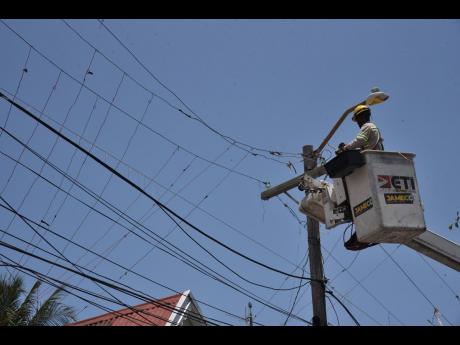Ansord Hewitt | The OUR’s purpose and impact
Integral to the development of orderly and prosperous societies are organisations that support, regulate, and hold accountable providers of essential goods and services. These entities are particularly essential nodes in societies in transition from lower to higher stages of maturity with a focus on the protection of consumers even while ensuring that service providers can operate profitably, which is essential to their ability to survive, thrive, and serve the public effectively.
It is a delicate balance but one that the Office of Utilities Regulation (OUR) has straddled well since opening its doors in 1997.
Critics of the OUR model often suggest that this kind of oversight mechanism is not necessary in a free market economy. The reality is that it is an essential feature of free market systems everywhere, including in the United States where public utilities are among the most tightly regulated industries. Thus, for example, the US Federal Energy Regulatory Commission regulates electricity, natural gas, and oil; the Environmental Protection Agency regulates water standards, and the Federal Communications Commission regulates radio, television, wire, satellite, and radio, across states and internationally.
The OUR is the outgrowth of government’s recognition in the 1990s, that Jamaica’s development trajectory required similar oversight of sectors that are essential to national development goals. It was established by an Act of Parliament in 1995 with the mission of contributing to national development by the effective regulation of utility services that enables consumer access to modern, reliable, affordable, sustainable, and efficient services while ensuring that service providers can make a reasonable return on their investment. Its initial responsibilities were regulating telecommunications, water and sewerage, electricity, and transportation. By a 2014 amendment to the OUR’s Act, transportation was removed from this portfolio.
MAJOR WINS
Since inception, the OUR has accomplished major wins for consumers, transforming the society in ways we now take for granted. Among the first and most wide-ranging impact on the society was the roles we played from 1999-2000, in establishing the regulatory framework for the telecommunications sector and the enactment of the Telecommunications Act of 2000. This laid the groundwork for liberalising the sector, facilitating market entry, competition, and making an array of service options accessible and affordable to average consumers across the country, inclusive of the accelerated deployment of mobile phone services and the mass penetration the country now enjoys.
Strategic interventions in 2013, and again in 2021, saw reduced mobile termination rates. Similar interventions in 2017 and 2022 lowered the fixed termination rates. Number portability, which makes it possible to switch between service providers (mobile and fixed) while retaining the same numbers, was introduced in 2015. In 2018, the OUR successfully implemented NPA (area code) relief activities which resulted in the introduction of Jamaica’s second area code ‘658’.
Since 2001, the OUR has also dramatically improved service requirements for the National Water Commission (NWC) through the imposition of quality-of-service standards. Even so capacity issues, and natural occurrences such as annual drought conditions and climate change, often result in inadequate service to water consumers. Consumers now know that a standard of service exists for this critical utility.
The OUR has also worked with the Jamaica Public Service Company Ltd (JPS) to improve service and secure significant benefits for consumers. In 2004, the OUR issued a tariff determination notice to JPS based on a price cap regime. Under this regime, JPS was allowed incentives to achieve greater efficiencies, such as: keeping electricity costs down; continuing service improvement; and providing opportunities to earn reasonable returns on its investment and be in a position to finance the operations of the business. The OUR can also take credit that the frequency and duration of outages have declined significantly, and households and businesses no longer fret about the adequacy of future supplies.
PROFESSIONAL WORKFORCE
Our successes in an often-challenging operating environment have been attained in large part due to a highly skilled and professional workforce with in-depth knowledge (including lived experience) of local sectors, and worldwide relevant subject matter expertise attained through ongoing training and collaboration with regional and international partners. In over two decades of existence, the OUR enjoys a high reputation among global peers for high-quality output. The high level of autonomy in its decision-making processes, funding that is independent of government, and a legislative framework that entrenches its authority and functions have helped in no small measure.
Even so, we are not resting on our laurels. The OUR is still a growing and evolving organisation facing persistent and emerging challenges. One that has been with us for a long time is that of consumer education. Significant sections of the population are still unclear about our roles and mandates, the decisions we have made and the impact we have on their lives. This sometimes feeds a narrative that the regulator is invisible, docile, and some even say useless.
In reality, human resource constraints and preoccupation with navigating the challenges of a dynamic environment often result in a less robust public profile than we would like, which affects our monitoring capabilities and a lag in the response time to consumer complaints. Contrary to expectations in some quarters, the organisation also has minimal enforcement powers and the processes for managing tariff reviews and licence applications and renewals are not optimal.
The OUR is committed to addressing the recognised shortcomings while meeting the operating challenges of its dynamic operating environment. Effectively managing the relationship with our service providers as well as the government bureaucracy remains a priority, as is mitigating the potential reputational damage from an uninformed public perception in an environment of ubiquitous social media.
We remain mission focused, looking for opportunities within the challenges to sharpen our efforts, continuing to positively impact national development and improve public awareness of our purpose and relevance.
Ansord E. Hewitt is the director-general, Office of Utilities Regulation. Send feedback to ourpublicaffairs@our.org.jm


